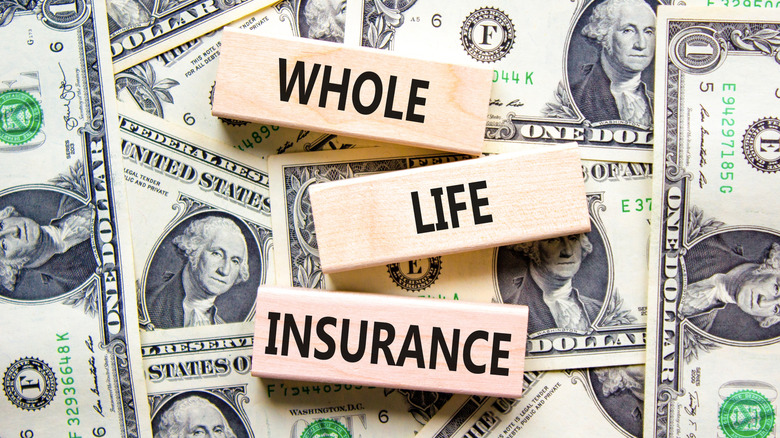9 Assets That Won't Increase Your Net Worth
Among the constellation of important financial figures and measurement tools available to consumers, the net worth calculation is one of the easiest to make — and yet is something that too few people engage with. Components of this conversation are largely spelled out. For instance, reaching $1 million in net worth is usually the hardest barrier to cross. Certain savings strategies are also frequently talked about when looking for ways to speed up net worth accumulation. But too often, people fall into the trap of sabotaging their own upward trajectory when it comes to financial wealth. While it's easy to say things like "just keep saving," or "cut out those business lunches" when talking about ways to improve your budgetary health, there are numerous pitfalls that can derail a person's progress in more significant ways.
Specifically, there many specific purchases that consumers can make that will positively or negatively impact their personal wealth. While some financial pundits might take this down to the micro level to talk about the opportunity cost of, say, buying a new pair of shoes versus investing that cash in a retirement account, on the whole, larger purchases generally have the most impact. These assets might feel like important purchases in the here and now, but they either don't help your net worth from the get go or actively harm its long term ascent.
A brand new car
MarkLines reported that a total of 16.8 million brand new cars were sold in the United States in 2024 (up from 15.9 million the year prior). However, a new car loses around half of its value in the first three years, creating a drastically negative financial profile in the process. All vehicles, regardless of age or type, deliver on a specific promise — your primary mode of personal transportation. As long as the vehicle operates, it is fulfilling this duty. While more expensive cars tend to provide a more comfortable or otherwise enriching experience while on the road, a clunker that gets you from point A to point B can be just as valuable as a brand new luxury sedan when it comes to the basic job of transportation. As a result, you should always think twice before buying a brand new car.
Newer, luxury-focused models, in particular, cash in on human vanity. While consumer might want to drive around in car that shows off wealth and status, it isn't necessarily worth it. If you're financing a car – which 37% of used car buyers did, and most new buyers do, according to Experian – then you are largely just throwing away money unnecessarily by investing in a vehicle that's more expensive just for the sake of appearances. There is virtually no chance that your car appreciates in value over the long term, and the more you pay in interest the less financial value you'll get out of your vehicle.
Designer and luxury clothing items
There is absolutely a time and place for people to buy more expensive clothing items rather than just sticking with cheap threads. Expensive clothing does tend to last longer than the cheap stuff, so it's entirely possible to gain value by investing strategically in specific upgraded items of clothing. However, designer items and similar luxury purchases don't always fit this mold. These can be highly expensive purchases that justify their price tags with flashy logos while not necessarily delivering durability and quality.
Designer items might look good, but at the end of the day, they are just clothes — unless you're actually at the extreme end of the wealth spectrum and investing in couture pieces that can genuinely provide investment value. However, for the vast majority of consumers, this isn't the case. Regularly spending more than you need to on clothing and accessories will fill up your closet with items you don't wear all that frequently (with individual clothing items getting worn an average of just seven times before being tossed). Plus, this habit will shrink your net worth by diverting important funds in the process.
Whole life insurance
Life insurance can be an incredibly valuable backstop to support your family in the event of a tragedy. With that said, whole life coverage differs from regular life insurance in that it doesn't feature a coverage window. Some insurance policies provide carveouts for those who have been diagnosed with a terminal illness, but generally speaking you aren't going to be the one who reaps the rewards of your investment. While some life insurance purchasers might want whole life coverage, for many consumers term life insurance can actually be the better deal.
Whole life policies can be five to 15 times more expensive than term policies, and they introduce a cash value into the equation which can complicate things. Even so, you're unlikely to actually accumulate value in this arrangement the same way you would with something like a stock or real estate investment. In fact, if you keep up with payments throughout your entire life, you may ultimately end up spending more on the policy than your benefit amount eventually pays out.
Many purchasers are ultimately seeking income replacement to care for their family's financial needs in the event of a tragedy. This means that coverage is either less important or no longer necessary when children grow up or the buyer retires and stops drawing a paycheck. It may be worth comparing the price of a term policy vs. a whole life option, or even simply selecting a term policy and investing the difference in a separate fund on your own.
Jewelry
There are absolutely some pieces of jewelry out there that can act as investment opportunities. However, for the average consumer these purchases generally exist far outside the price range they are able to consider. For the most part, jewelry is not an appreciable asset. Even a large diamond engagement ring tends to lose value rather than gain it. This is because diamonds are often sold at a significant markup, with some estimated markups as high as 300%.
This isn't to say that jewelry is a total waste of money. This kind of investment typically goes towards sentimentality and shared memories rather than acting as a financial reservoir. Understanding this relationship is critically important in any jewelry investment you might make. Splurging on a nicer stone or better quality metal for someone you love might be worth it in certain circumstances. However, you shouldn't go overboard thinking that the jewelry will deliver some sort of long-term financial stability.
Cash back dollars and rewards points from credit cards
Reward programs are a big draw for credit card users. Indeed, responsible use of a credit card account that delivers a steady stream of rewards back to you can be a nice way to buoy your personal finances. But the reality is that the average card holder only accumulated cash back to the tune of around $280 in 2024, according to a report from Lightspeed Financial Service Group, per CNBC. While that's a nice trickle of additional value, it's not going to fund your next vacation or pay the mortgage.
More importantly, the only way you'll actually enjoy these rewards is if you pay off your credit card balance in full every month. Allowing your purchases to accumulate interest can quickly negate the value of any payouts or rewards. If you rack up $280 in cash back rewards but have to pay $300 extra in interest on the balance that you've carried over from month to month throughout the year then you're actually an extra $20 in the hole over where you would find yourself had you never pulled the credit card out of your wallet in the first place.
Rewards cards offer a colorful vision of free money and points that can be used for travel and other luxuries with the intention of enticing buyers into spending more than they normally would. This financial tool can be valuable, but you must use it responsibly and consistently pay off the balance in order to actually benefit.
Timeshare properties
Timeshares are a lousy use of your financial resources from start to finish. Timeshares are heavily maligned in pop culture for a reason. If timeshares were as great as they claim to be, more people (than the roughly 10.5 million American households, as of May 2025, per Linx Legal, who currently own timeshares) would own one, and the salespeople involved in peddling them wouldn't have to work nearly as hard as they do to get buyers to sign on the dotted line.
Timeshares age poorly for investors, and they do so in a hurry. You'll generally have trouble utilizing the property at times that actually suit your needs and schedule, and in many instances annual maintenance fees will only continue to rise every year. Maintaining your stake in a timeshare can become prohibitively expensive in a matter of years, not decades. Unfortunately, there's one final aspect of the timeshare conundrum that often sticks around to complete the cycle of abuse. It can be incredibly difficult to get out of an agreement, and they can even include language about other people inheriting the financial obligation after you have passed. Timeshare buyers often must spend thousands to buy their way out of what, at first, seemed like a great vacation investment.
A recreational vehicle
Boats, hobby motorcycles, RVs, and ATVs, among numerous other recreational vehicles, exist in their own world of the transportation marketplace. At a baseline level, these are assets that can help you get where you're going in style. But recreational vehicles of this nature are ultimately built for fun. Many boat buyers have invested in an aquatic vessel, only to find that ownership costs and maintenance dramatically increase the total financial responsibility of boat ownership. The same can be said for many other recreational tools.
While it can be easy to think of these kinds of vessels as investments rather than fun purchases, they ultimately suffer from the same fate that a car does in terms of depreciation. Thanks to this rapid depreciation in value, buyers should not expect to recoup their costs — even if they change their mind about a boat or RV quickly. That said, these can be a nice lifestyle addition but they shouldn't be part of anyone's ongoing financial plans unless it's firmly understood that the asset won't add to your bottom line.
Many 'tools' you use at work
With technology dominating the workplace today, many commuting to their office or working from home log in on a laptop computer that's often loaded with software designed to help them do their job. While there are still many professions that require physical implements to get the job done, many workers utilize virtual tools that can cost a notable amount of money without the option to resell in the event of a job change or retirement. Software packages nowadays run on license agreements rather than physical installation disks that the buyers own — without discs to install the software a buyer has virtually nothing in the way of ownership.
A similar trend has taken place in the farming community, with John Deere holding agricultural workers hostage by suggesting that physical equipment is licensed to buyers just like software, a non-tangible good. The company enforces this mindset by attempting to manipulate owners' right to repair. As a result, across a broad spectrum of gear you might rely on to perform your work, resale value is murky at best and perhaps even nonexistent.
A large home that traps financial value
Investing in "too much house" or sinking too many resources into home enhancements that won't return expanded financial value can limit your financial mobility in the present. It also serves as a potential stumbling block long into the future and can hinder your ability to meet your retirement goals or save for other important life expenses like vacations with the family the decision to start a family in the first place.
A home is generally thought of as a net-worth-enhancing asset; real estate typically increases in value over time, adding to your financial math rather than subtracting. From January 2000 to November 2021, annualized home value increases were 4.6%, according to the Federal Housing Finance Agency. However, that rosy outlook hides a different facet of home value math that can easily become a sticking point. Yes, you'll enjoy a gradually rising home value, but you might not have the financial leverage to afford other important things in life. Plus, to make ends meet you might end up needing to refinance your mortgage — eviscerating any value gain.









